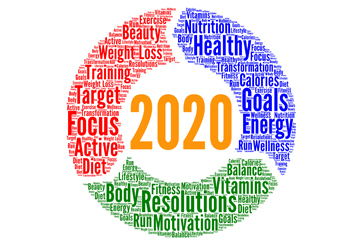Each year, as the calendar turns to January, millions of people make New Year resolutions mostly centered on popular genres such as health and fitness. However, research shows that while about 60% of us make New Year’s resolutions, only about 8% of us are successful in achieving them (www.inc.com). Regardless of whether they succeeded with their previous resolutions, most people go ahead and make a new set of resolutions-hoping for the best. This year, doctors at the American Medical Association (AMA) have released a list of 10 wellness-focused resolutions for 2020 to “help Americans make the most impactful, long-lasting improvements to their health in 2020 and beyond”.
10 AMA-Recommended Resolutions for a Healthier 2020
The 10 recommendations are as follows:

- Learn your risk for type 2 diabetes: One of the most common chronic health conditions in the U.S., diabetes affect an estimated 30 million Americans and almost a quarter of Americans who have type-2 diabetes are undiagnosed, and even more people may have prediabetes without knowing it, says the Centers for Disease Control (CDC). So take a self-screening test at DoIHavePrediabetes.org to find out if you’re at risk.
- Be more physically active: Adults should do at least 150 minutes a week of moderate-intensity activity, or 75 minutes a week of vigorous-intensity activity.
- Know your blood pressure numbers: Hypertension can lead to heart attack or stroke. So resolve to check your blood pressure and control it if needed.
- Eat healthy: Reduce intake of processed foods, especially those with added sodium and sugar, red meat and sugar-sweetened beverages for a better health. Instead, include more plant-based foods such as olive oil, nuts and seeds in your diet, and drink more water instead of sugary beverages and even 100% fruit juices.
- Take antibiotics exactly as prescribed: If you have been prescribed antibiotics, take them exactly as prescribed. Antibiotic resistance is a serious public health problem and antibiotics will not make you feel better if you have a virus, such as a cold or flu.
- Restrict alcohol consumption: The U.S. Dietary Guidelines for Americans makes the following recommendations for adults of legal drinking age: one drink per day for women and two drinks per day for men.
- Quit tobacco and e-cigarette: Quitting smoking or tobacco and e-cigarette use (or vaping) is the best resolution anyone could male. Smoking puts you at risk of lung cancer as well as other types of cancer and is also associated with heart disease and other serious medical conditions. The AMA recommends talking to your doctor about how to quit vaping, and committing to keeping cars and homes smoke – and aerosol-free.
- Follow instructions on pain medication: If you’re prescribed painkillers, take them exactly as instructed by your doctor. Get rid of extras by taking them to a drug take-back site to prevent misuse. Sharing prescription drugs or improperly disposing of them may put them in the hands of people at risk for opioid dependence.
- Get your vaccines on time: This will help you and your family lower risk of getting sick and transmitting disease to others. The AMA recommends that everyone age six months or older get the annual influenza vaccine. Pregnant women can receive the flu vaccine during any trimester, but should get the Tdap vaccine early in the third trimester to protect against flu and whooping cough.
- Manage stress: Chronic stress can threaten your physical, mental and cognitive health. Find stress-reduction techniques that work for you. A good diet, sufficient sleep, daily exercise and wellness activities are key ingredients to managing stress.
In addition to following AMA’s recommendations, other New Year resolution suggestions include spending more time with your loved ones, avoiding unnecessary spending and saving more money for financial stability, having a plan to deal with obstacles, establishing a healthy sleep routine. Identify the right resolution that will make a difference in your life and create a plan on how to achieve it. Setting realistic goals will make them more attainable. You can’t improve your health in a single leap, but taking small steps can take you closer to your goal of a healthier, happier future.